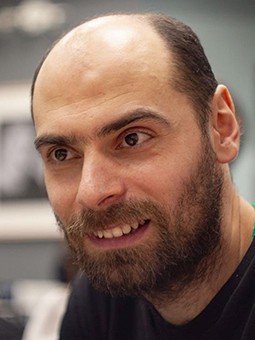How to help others during Great Lent?
Let’s talk about good deeds in connection with Great Lent. More competent people will undoubtedly tell you more about the refrigerator and the prayer book, but doing good deeds is my profession in a way, and therefore, perhaps, my reasoning will be of value.

Vladimir Berkhin. Photo: predanie.ru
Vladimir Berkhin is the President of the Tradition Charitable Foundation and a charity expert.
Great Lent is a time of special attention to spiritual matters, including matters of mercy. This is the time when a person teaches himself to be better than he was before fasting. Otherwise it is not clear why “fast” at all, in this sense.
But if my task is to teach, then it is perfectly reasonable to use a few simple principles, proven by time and practice. I will deliberately hardly touch upon spiritual aspects in the text, leaving these questions to professionals, and I will give examples from my own life, simply because I know it better than all other lives.
Help The Ones Your Heart Tells You To
A good deed must be good for real, it must come from the depths of your heart and be important to you for some reason. If a good deed is done purely mechanically, “because it should be done”, if your heart does not participate in it, there is a great risk that over time doing good deeds will start to irritate you and you will quit this activity. This is diagnostically useful, because it shows a person his or her true state, but this is not the goal.
I have tried several times to train myself to help those I don’t sympathize with — animals, for example — and each time it ended in nothing. After several attempts, I gave up this activity, which did not bring me joy, which seemed stupid and tedious to me.
Put Efforts
Good deeds should be visible to you, they should not be too small. Ideally, doing good deeds during Lent should be new and slightly non-standard for you, so that it takes at least a small, but quite conscious effort to perform it each time. It is necessary to at least remember the need to do a good deed, and not to use automation. Because you can’t develop a skill without efforts.
I have subscribed to a dozen and a half foundations for regular donations for some small amounts, but I don’t remember who I donate to. The sums are too small, the efforts are too small, and whether the money is written off from me or not, nothing will change in my soul.
Don’t Expect Gratitude
Good deeds should done in secret. Simply because it is the commandment, and in order to keep pure motivation. A good deed is done for the sake of the Lord and neighbor, and not for the sake of anyone’s approval. And this rule should be observed strictly.
Moreover, the first rule for charity workers is: “Don’t expect gratitude.” Such motivation is fleeting, besides, gratitude depends on other people, and in this case, mercy quickly gives way to marketing. If a soldier fights in order to shine with awards, and not for the sake of victory, he will leave the battlefield as soon as he receives the award, even if he was awarded undeservedly.
Do Good Deeds Regularly
It is not super-efforts that are important in order to learn, but perseverance and regularity. Distribution of property to the poor is a feat, a worthy deed, but it is a one-time deed. It will change life, but it is impossible to distribute property regularly and there is a serious chance to turn from a well-meaning wealthy person into a poor person, but embittered, who is sometimes regretting his “rash step” or, instead, proud of the greatness of his own deed.
Moreover, it should not be too rare, if we are talking about learning. If you do something good twice during fasting, you will not lose your reward, as the Gospel says. But you probably shouldn’t count on serious changes in your heart either. If you go to the gym every three weeks, you are unlikely to get noticeable results.
Do Not Impose
Your good deeds should not be violent towards the one you are helping. This rule is important if you decide – which is perfectly correct – to help someone close to you with whom you have a formed relationship. Regularly visiting a lonely relative, washing dishes for someone (and it is better to do this for those who, most likely, will not notice this), showing care and participation – in all of this it is important not to turn into a formidable “inflictor of good”, imposing his care where he was not asked.
I have ruined too many relationships to count this way. When I tried to mercifully open a person’s eyes to his shortcomings, our relationships worsened especially badly.
Rid Mercy from Unnecessary Rationality
It’s strange, but it seems to me that it is better not to evaluate the fasting virtue from the point of view of “effectiveness”, not to calculate how serious the problem will be solved by your participation and what will be the social effect for the invested ruble or hour.
Fasting is the time of correcting oneself, not the universe.
Focus on changes in your own heart, on relationships, on manifestations of mercy, not on business thinking in the social sphere. Because the latter alienates the matter from the doer, it becomes less personal, which means it changes you less.
I do not encourage you to give alms to fraudsters (although Saint John the Merciful did just that), but it is definitely worth saving your mercy from unnecessary rationality during fasting. Reasonableness will return when the next stage comes and the already formed skill think critically and in a clarified way on what, actually, is being done and why.
Give Up Something Useless
Fasting is a time of self-restraint and discipline. This means that good deeds should not add to the hustle and bustle of life – a modern citizen has already an excess of it. That is why, in a sense, good deeds are not very possible without giving up something useless, which takes your time and energy. It can be difficult (and it is worth approaching the restrictions carefully), but it is important at least from the point of view that your work made you a human from a monkey, and not just a tired monkey.
Pray and Read Scripture
And the last thing. Fasting is a religious practice, which means that works of mercy during fasting are included in religious practice. But practice is an integral piece, it is rather difficult to divide it into parts.
Following only one side of the fast is like trying to get an education, constantly leaving at the middle of a lecture and reading only half of the textbooks.
If you took the trouble to fast in one way or another, made changes in your lifestyle according to the church calendar, then it is logical, at least in part, to add not only deeds, but also thoughts to it.
Simply put, if you decide to do works of mercy by fasting, try to do them with prayer and reading the Scriptures. Just for consistency, for completeness of immersion in context.
And I am almost sure that if these recommendations are fulfilled, if you apply heart and will to them and endure from Forgiveness Sunday to the Resurrection of Christ, then it will be impossible not to notice the result.

















